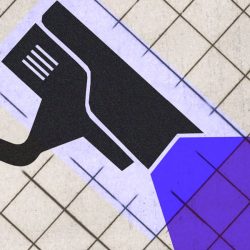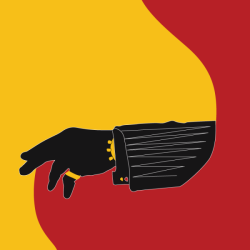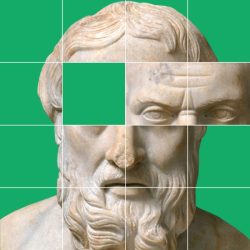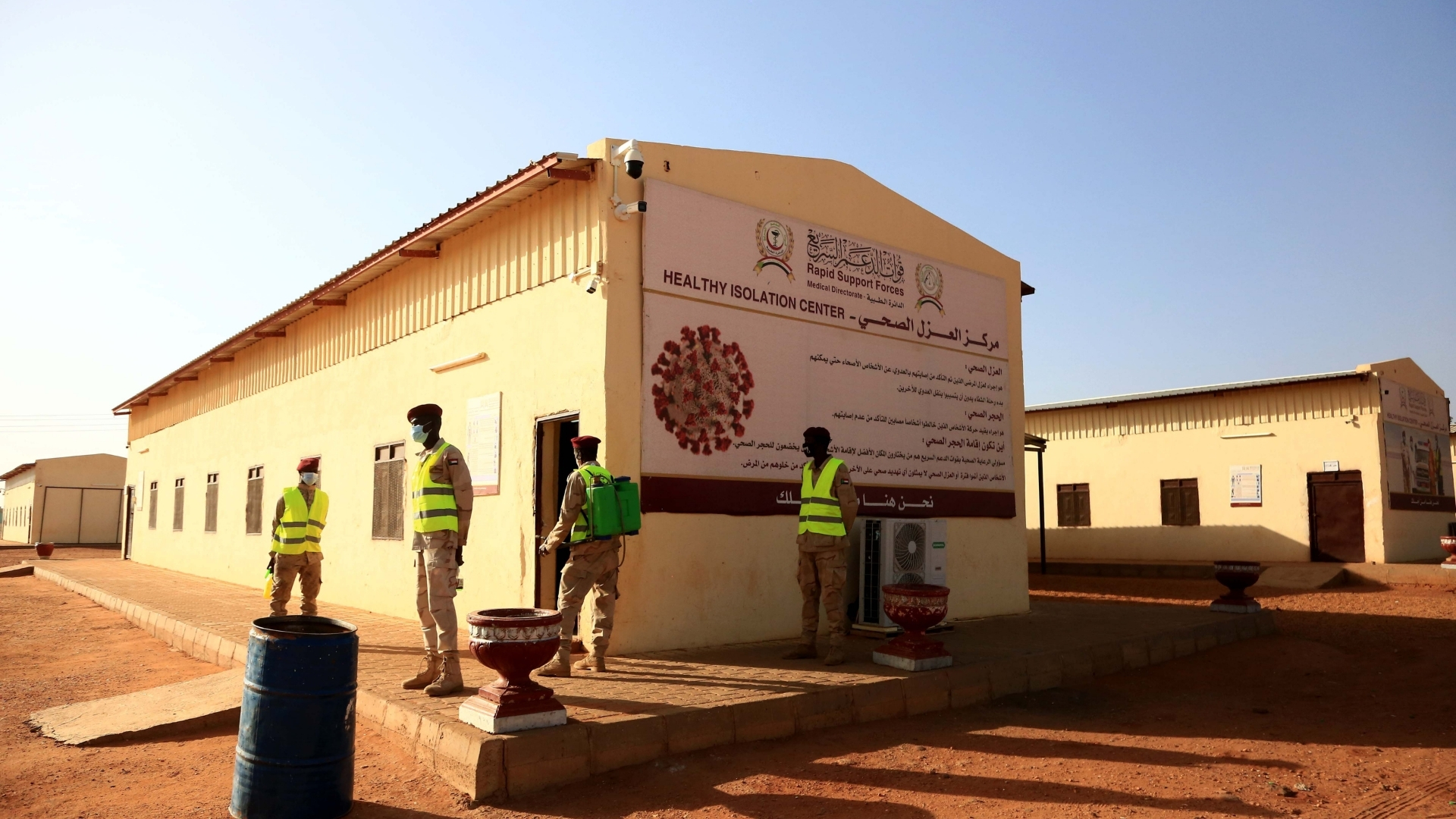Back in January, Abdel Rahim Hamdan Dagalo sat at the head of a large dining table, flanked by two advisers. As the deputy commander of the Rapid Support Forces, a powerful Sudanese paramilitary group, he had welcomed me to a feast at his home in Khartoum, the nation’s capital. His servants heaped the table with grilled fish, a mountain of fresh bread, chunks of lamb in gravy, potatoes with minced meat and a fruit salad that he insisted I try.
After dinner, Abdel Rahim changed out of his traditional white robe and into a blue blazer and light blue button-down shirt. He then sat on the couch in a living room furnished with green plastic plants and crystal lights. There, he began to speak about the RSF’s charity work during the coronavirus pandemic. A cameraman recorded as we talked.
The RSF, he told me, “understands the struggle and shortcomings of health and education services and the economy. That’s why we provide these services, especially medical help because of the Covid-19 crisis — to bridge the gap between what people need and what’s available to them.”
The RSF is attempting to transform its image from that of a violent militia responsible for numerous atrocities to a well-funded national force, headed by benevolent statesmen. Providing an effective response to Covid-19 is an important part of its broader PR campaign. However, rebranding the organization and its members as philanthropic peacemakers is no easy task.
The RSF evolved out of the conflict that raged in the western province of Darfur from 2003 to 2008 and claimed more than 300,000 lives. The violence erupted after years of drought and state-neglect, which had sparked fierce rivalries between local Africans and Arabs over land and resources.
The crisis encapsulated the regional fault lines in Sudan. Arab elites in the center and north of the country have historically neglected and exploited Africans and Arabs populations living in the peripheries. In Darfur, these ethnic labels are hollow, with the term “Arab” traditionally referring to camel herders or pastoralists, while “African” applies to arable farmers. Both are black and Muslim and have intermarried for centuries.

No longer willing to tolerate the marginalization of their region, two mostly African rebel groups from Darfur raided an airport in the province in April 2003. Sudan’s former dictator Omar al-Bashir manipulated inter-communal tensions to crush the rebellion. He paid, armed and trained Arab camel herders to commit summary killings and burn down villages, while the military deliberately bombed civilians from the air.
Six years later, the International Criminal Court indicted Bashir for sanctioning genocide, crimes against humanity and war crimes in Darfur. However, in 2013, Bashir consolidated the Arab militias into a new body, under his direct control.
The Rapid Support Forces were tasked with patrolling Sudan’s frontiers and crushing rebellions and insurgencies. During these bloody campaigns, they captured Sudan’s gold mines, which are worth billions of dollars. The force also championed its cooperation with the European Union to halt irregular migration, a claim Brussels denied.
Flush with money, power and connections, the RSF cut ties with Bashir when he was ousted by nationwide protests in April 2019. The leadership of the newly independent force quickly secured a place in Sudan’s Transitional Military Council, which shares power with a disjointed civilian alliance called the Freedom for Forces and Change.
“Before the revolution, there were people who viewed the RSF as subordinate to the old regime. Anyone who wanted to oppose Bashir would work against the RSF,” said Abdel Rahim. “But the RSF supported the revolution and now we’re protecting the transitional period.”
A PR offensive
Since the outbreak of the novel coronavirus in 2020, the RSF has bolstered its reputation by helping towns and villages across the country mitigate the spread of the virus. According to official statistics, nearly 30,000 people have contracted the disease in Sudan and almost 2,000 people have died. However, medical professionals suspect that the real figures are much higher, and many people say that they have fallen ill or lost loved ones to the disease.
Last month, the RSF granted me a tour of one of its most publicized initiatives: a quarantine center located inside a large, barbed-wire-fenced military base in a suburb of Khartoum. About 200 employees work at the facility, including several farmers tasked with planting flowers and trees to reduce the dust and pollution that plagues the city. The operation is staffed by doctors and nurses and equipped with oxygen tanks, beds, masks, personal protective gear, sanitizer dispensers and computer monitors.
“We have instructions from our leaders that any citizen who needs to receive a medical service should be able to receive it immediately. We never turn anyone back,” said Colonel Yazid Abdeem, an orthopedic doctor who runs the center.
However, I did not spot a single civilian during my visit. Abdeem later admitted that most people that quarantine in the center are RSF mercenaries who return from fighting in Yemen for the Saudi-led coalition, which has been waging war on the country’s Houthi rebels for almost six years. He added that the center, along with 18 more clinics and hospitals built by the RSF across Sudan, has created hundreds of well-paid jobs.
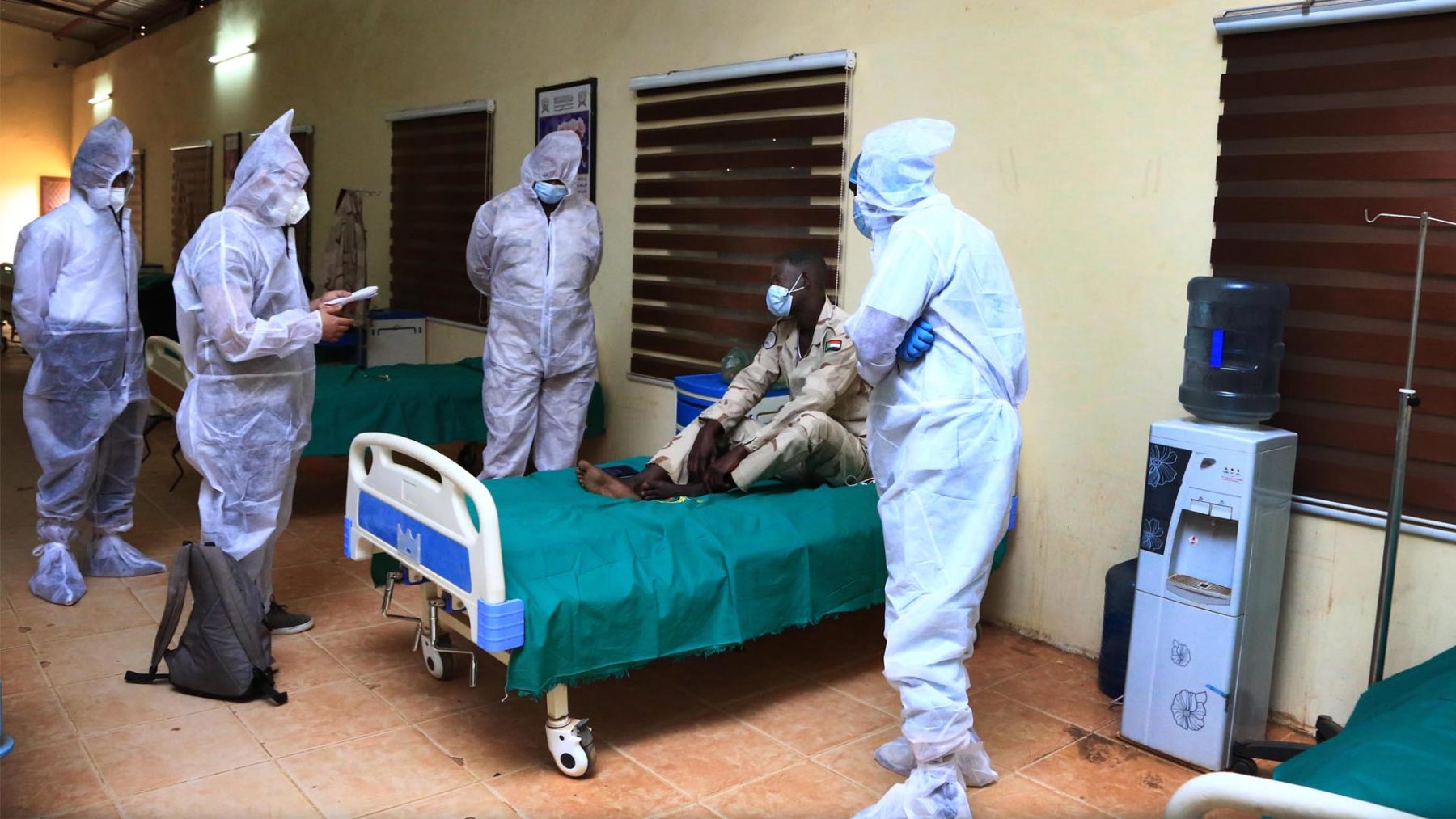
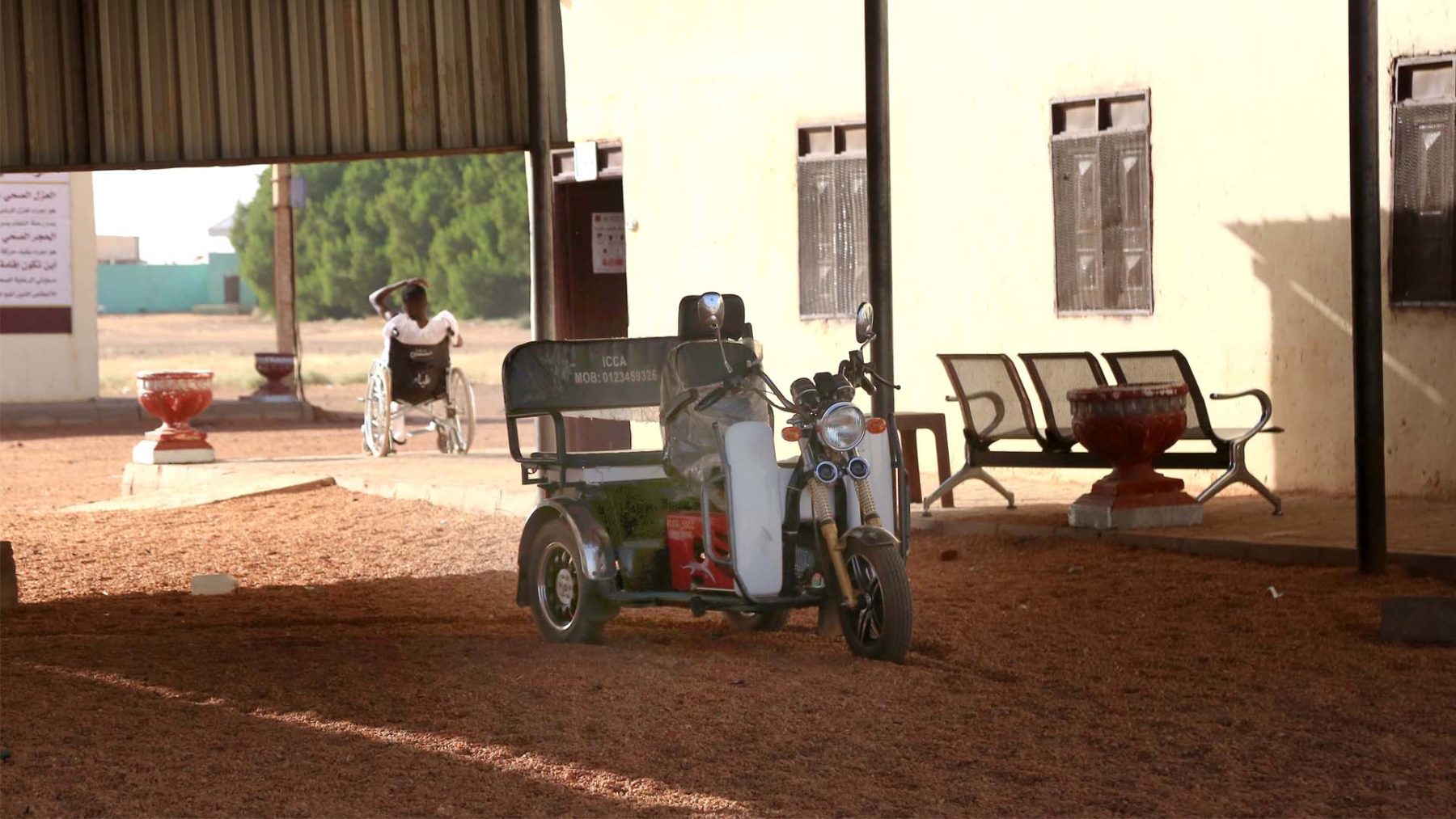
According to Abdeem, the average salary for an RSF doctor is $120 per month. That may sound like a small sum but, owing to the country’s rapidly depreciating currency, it is more than four times what doctors receive in public hospitals — many of which have been shuttered because of an acute shortage of medical equipment and supplies. The RSF has also responded to Sudan’s health crisis by delivering convoys of supplies to poorly served districts nationwide.
“At a time when governmental hospitals are closed, Sudanese citizens are finding help from the RSF,” said Abdeem.
While Abdeem’s statements are clearly the official RSF line, the group’s response to the pandemic does contrast starkly with the inaction of the Sudanese Armed Forces. Despite being well funded and resourced, the military has done little to combat the virus or come to the aid of those affected by it.
“The army doesn’t care. It isn’t using any of its capacity to help out against Covid-19,” said Dr. Suliman Baldo, an expert on Sudanese politics and humanitarian crises. “This puts the RSF in a positive light, even if they’re helping out for ulterior or symbolic motives.”
Peace and human rights
The RSF’s attempts to rehabilitate its reputation began long before the pandemic, but the force stepped up those efforts following a well-reported massacre that took place in Khartoum on June 3, 2019. That day, at least 128 people were killed and dozens assaulted and raped during a sit-in outside the nation’s military headquarters.
After Bashir’s removal from office, protesters had gathered to pressure the army to transfer power to a civilian body. Witnesses later told Human Rights Watch that security services fired at protesters trying to escape and that the RSF played a major role in the carnage. The leader of the RSF and the older brother of Abdel Rahim, Mohamad Hamdan Dagalo — better known as Hemeti — began to forge relationships with prominent human rights activists to mitigate accusations against his men.
Enter Montaser Ibrahim, a 42-year-old man who fought against RSF commanders during the height of the conflict in Darfur. He has abandoned armed struggle for more than a decade and become an advocate for unity between the people of Sudan’s marginalized regions. In Khartoum, Hemeti reached out to him and discussed how the RSF could gain the trust of the communities it once terrorized.
“I told Hemeti that the real challenge for him was to transition from a militia leader to a statesman,” said Ibrahim, who says that he worked as an unofficial consultant to the RSF.
Hemeti took Ibrahim’s advice and last fall successfully negotiated the Juba Peace Agreement. On paper, the deal is designed to mend fences with four rebel groups that had long been exiled from Sudan. The global community celebrated the deal, with U.N Secretary General Antonio Guterres saying that it signaled “the dawn of a new era for the people of Sudan.” The pact also ushered in a new era for Hemeti. After years of perpetrating horrific violence, he was now able to portray himself as a peacemaker.
However, Hemeti remains a polarizing figure among civilians in Darfur. The joint U.N and African Union Peacekeeping Mission — formed to protect civilians in Darfur in 2007 — withdrew in January. Since then, the military, the RSF and Sudan’s General Intelligence Service have been responsible for bringing security to a province awash with weapons and communal tensions. Now, many locals fear that the RSF will fail to protect them should they clash with its old allies.
Despite these concerns, the RSF is publicly adopting a number of human rights stances. In 2018, the group opened a child protection office in Khartoum. The operation provides a counter-narrative to media reports that have accused the RSF of recruiting a large number of child soldiers to fight as mercenaries on behalf of the Saudi-led coalition in Yemen. Its head is Colonel Omer Hamdan, a relative of Hemeti.
Sitting in his office in downtown Khartoum, Hamdan insisted that no one is recruited into the RSF without a national ID number and that additional checks are run should they appear to be under the age of 18. He then blamed a foreign conspiracy for a 2018 New York Times article that reported that, according to returning fighters, at least 20% of Sudanese mercenaries in Yemen were between the ages of 14 and 17.
“Our fighters have baby faces. That’s all it is,” he said.
Damage Control
While the RSF’s reputation laundering has been effective, it hasn’t staunched all criticism of the force’s human rights record. Outrage erupted across the country in December, when the RSF took a 45-year-old electrician named Baha el-Din Nouri from the side of the road in his neighborhood in Khartoum. Neither Nouri’s seven younger siblings, nor his mother were informed of his whereabouts at the time of his disappearance. They were telephoned five days later and told to pick up his body from a local morgue.
The family said that doctors insisted that Baha died from natural causes. But Mohamad, his younger brother, said that there were clear signs of foul play. He preferred not to describe the state of his brother’s corpse, but stressed that a second autopsy confirmed that Baha was tortured to death.
“The first question we asked was, `Who killed Baha?’” Mohamad said, sitting in his childhood home, where his mother and three sisters all still live.
A government investigation implicated the RSF, which soon announced on Facebook that Baha had died while in the custody of its intelligence unit. Mohamad said that the RSF’s leadership tried to contact the family many times to offer their condolences, yet the Nouris refused to receive them at their home.
During my conversation with Abdel Rahim, he conceded that Nouri’s death was unacceptable, yet that the officer who arrested him had information that he was a terrorist — a charge frequently used by security agencies to justify abuses. Nouri’s family denied the accusation.
With the RSF cameraman still filming, he said that the men who killed Baha have been arrested. He then blamed shadowy forces for orchestrating a media campaign to “defame the RSF” by blowing the incident out of proportion.
Contrary to Abdel Rahim’s belief, there actually appears to be a coordinated plan to paint the RSF as the savior of Sudan. In early January, a lengthy advertisement on the front page of the daily newspaper Al Tayyar celebrated the force’s role in ousting Bashir and its good works during the pandemic. Abdel Rahim denied that the RSF was behind it, yet he echoed almost identical talking points.
“Covid-19 is a serious illness. That’s why we never hesitated to help our people,” he said. “Neither the civilian government nor the military has helped as much as us during the pandemic.”

